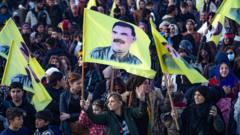The PKK is seeking an end to decades of conflict with Turkey, hoping for a pathway to autonomy and peace in the region.
Kurdish Fighters Announce Ceasefire as Leaders Call for Disarmament

Kurdish Fighters Announce Ceasefire as Leaders Call for Disarmament
Kurdish group PKK proclaims a new ceasefire in response to calls for peace from imprisoned leader Abdullah Ocalan.
In a significant move towards reconciliation, the Kurdistan Workers' Party (PKK) has declared a ceasefire with Turkey after a message imploring disarmament was relayed from their imprisoned leader, Abdullah Ocalan. The announcement took place on Saturday, with the PKK expressing optimism that Turkish authorities would facilitate Ocalan’s release from solitary confinement, where he has been held since 1999. The ceasefire marks a potential turning point in a conflict that has claimed tens of thousands of lives over the past four decades.
Abdullah Ocalan, who is regarded as a pivotal figure in Kurdish nationalism, addressed his followers earlier in the week, emphasizing the need for peace and the eventual dissolution of the PKK. He urged the group to lay down arms, pointing out that its original objectives of an independent Kurdish state have evolved towards a call for autonomy and increased rights within Turkey.
The decision comes in light of a recent collaborative effort for peace led by Devlet Bahceli, head of Turkey's ultra-nationalist party, who has advocated for steps to end hostilities. Following Ocalan’s call to action, the PKK stated that they would refrain from armed engagements unless provoked and laid out conditions that required improvement of Ocalan’s prison conditions.
While the announcement attracted considerable attention and was met with hopeful gatherings among Kurdish populations in cities such as Diyarbakir and Van, skepticism lingered among certain factions. Some Kurdish and Turkish commentators voiced concerns regarding the sincerity of the Turkish government, specifically criticizing the ruling AKP party for perceived intentions to suppress dissent rather than genuinely seek a resolution.
The history of violence between the PKK and Turkish forces, marked by a particularly intense conflict from 2015 to 2017, raises questions about sustainable peace. Despite positive developments, recent months have witnessed escalated tensions, including violent episodes and arrests targeting pro-Kurdish political figures in Turkey.
As both sides navigate this delicate moment in history, the commitment to the ceasefire and the trajectory of dialogue will prove critical in determining the future stability of the region and the integrity of Kurdish rights in Turkey.



















